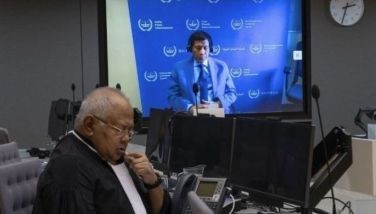PBBM’s Year 3 report card (Part 3)

I am fully aware of the gravity of my words when I say that the first year under PBBM was promising but the last two were a squandered opportunity. I wish it were different. But the fact remains that PBBM has not even began to address the fundamental causes of our economic underachievement and social problems until now.
As mentioned in the first two installments, the most serious problem that remains unaddressed is the scandalous level of corruption and the poor quality of political leadership. PBBM has done nothing to curb the abuses of the political elite – let alone launch an earnest anti-corruption campaign. The 2025 national budget he fought so hard for even encourages corruption. It primarily serves the interests and pockets of congressmen and senators, with whatever left made to trickle down to the rest of us. Nor has he initiated any electoral reforms to dismantle political dynasties or improve the quality of our leaders.
Governance-wise, PBBM’s presidency appears adrift – lacking in direction and coherence. This stems from his failure to articulate a compelling national vision. The “Bagong Pilipinas” campaign, initially framed as a branding exercise for reform, has proven to be more a political gimmick than a vision or doctrine of governance. It is dead in the water, with the administration falling short on every objective it set for itself. It is not even spoken of anymore. The eight point socioeconomic agenda is not a vision – it is merely an enumeration of priorities and action points.
We yearn for an aspirational, long-term goal that is a balance of inspiration, ambition and achievability. A vivid picture of what a country aims to become over the following decades will inspire, rally and align the nation towards shared goals.
Without a clear vision, our work, as a nation, becomes disjointed. Performance expectations of government officials become blurry and the President gets away with delivering the barest minimum.
Even at this late stage, I still struggle to identify the core thrust of PBBM’s presidency. Is it an agricultural revival? That seems unlikely, given the absence of meaningful structural reforms and the continued dominance of agri cartels. Is it a manufacturing resurgence? That doesn’t hold either, as the legal and bureaucratic hurdles that discourage investment remain unresolved. Could it be an infrastructure boom? No either – no landmark or game-changing infrastructure project has been introduced by this administration. It certainly isn’t fostering national unity since political divisions remain as deep as ever. Nor is there any discernible drive toward anti-corruption or electoral reform.
Three years into his presidency and we still don’t know where this administration is taking us.
Structural defects
Let me define what structural defects is in the context of national development. Structural defects are the laws, regulations and bureaucratic frameworks that impede development. They distort markets, deter investments, weaken institutions and prevent the economy from realizing its full potential. Unless these are decisively resolved, no real, lasting progress can be achieved.
Take, for example, the structural defects that impede realizing a robust, inclusive economy rooted in advanced manufacturing and high-value services. This objective cannot be achieved unless the country becomes an attractive destination for foreign direct investment (FDI). Why? Because FDIs provide the scale of capital formation that neither government nor the private sector can deliver alone. It also brings new technologies, generates high-quality employment, increases tax and exports revenues.
Despite the administration’s many investment missions abroad, the Philippines continues to lose out to its neighbors. Zero growth in FDIs from 2023 and 2024 and the numbers look bleak for 2025. The reason: structural defects that remain unresolved.
According to the World Bank’s 2025 report, the country’s most serious structural defects include: weak enforcement of intellectual property rights, fragmented innovation policies and outdated regulations that impede competition and innovation; the lack of efficient mechanisms that allow businesses to exit or restructure smoothly when facing business insolvency and the inefficient and costly processes of settling commercial disputes.
To these, add the persistent structural defects that are widely acknowledged: infrastructure gaps, high energy costs, regulatory complexity and bureaucratic red tape, corruption and extortion at various levels of government and ownership restrictions in key sectors.
No amount of investment roadshows will compensate for these deep-rooted defects. Investors are not swayed by promises – they are guided by risk, regulation and return.
The critical question is this: is PBBM confronting these structural defects with the doggedness and political will required to resolve them for good? No, at least not at the level required. These issues are not even forefront in his agenda. He is squandering the great advantage of having a majority in Congress and the Senate. Our FDI performance would be much better if only he worked to remedy our structural defects with the same verve, vigor and velocity he did to get the Maharlika Bill passed.
The root causes of the country’s woes are structural – therefore, the solutions must be structural too. If the President fails to resolve these defects, then FDIs will continue to elude us, the same with food security. Infrastructure development will continue to crawl, educational deficiencies will fester and many more national problems will remain unresolved. In short, it will consign the country to remain uncompetitive.
Without structural reforms, PBBM’s body of work will come down in history as a patchwork of superficial reforms that yield minimal impact, all unable to withstand the test of time.
With three years remaining in his term, I hope PBBM reassesses his leadership agenda and begins to resolve the structural defects that plague the nation. It’s going to be difficult, unpopular among vested interests and will cost tremendous political capital. But he must stay the course. This is what strong leadership is all about.
* * *
Email: [email protected]. Follow him on Twitter @aj_masigan
- Latest
- Trending





























